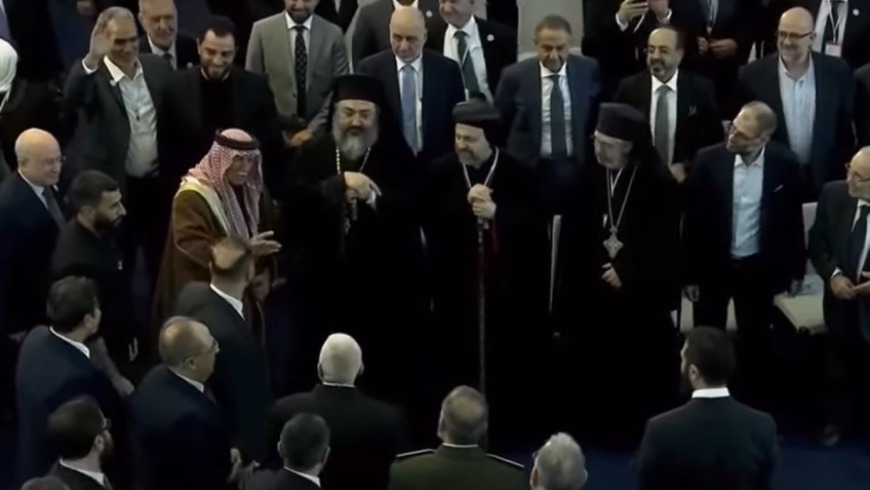It is self-evident that many Syrians sought the downfall of the Assad regime in pursuit of, among other things, freedom of public expression after decades of repression. In the months since the regime’s collapse, Syria has witnessed unprecedented opportunities for open discourse. But it is worth asking whether this expansion of expression stems from a principled commitment to civil liberties, or merely from the institutional disarray that followed the regime’s sudden fall.
The new authorities have shown clear discomfort with political parties, preferring instead to engage with citizens as representatives of regions or local communities. In their view, forming or reviving political parties is premature—something to be postponed until security, governance, services, and the economy stabilize. For their part, most Syrians do not seem to object to this arrangement. Their memories of party politics are shaped by the Baath Party’s instrumental role—alongside other National Progressive Front factions—in propping up authoritarian rule and providing ideological cover for the regime’s expansion of control. Meanwhile, opposition parties remained largely spectral in the public imagination, oscillating between prison and clandestine activity. Even when these parties were given a chance to assume leadership roles in the opposition’s exile institutions after 2011, the overall impression they left was far from positive—even in the case of groups perceived as the largest, best organized, and most likely to expand in a street thought to be theirs by default, such as the Muslim Brotherhood.
Still, political expression does not need to begin with formal parties, especially in a society marked by political underdevelopment. While most Syrians remain skeptical of party structures, many have embraced individual expression—particularly through social media. Facebook, in particular, has seen such a surge in activity that it now effectively serves as the public sphere’s daily chronicle.
Yet this arena is not without major flaws. While collective action remains elusive, the fragmentation of discourse into individual voices is hardly a healthy alternative. Personal pages—those of influencers and ordinary users alike—have proliferated, while the role of group-based discussions has diminished. Even when such groups are formed, especially on platforms like WhatsApp, they tend to become arenas for personal rivalries, ideological clashes, withdrawals, reconciliations, and repeat cycles of disintegration.
As is widely understood, democracy does not emerge by decree. It grows—often painfully—from the recognition that no group can indefinitely eliminate or marginalize those who differ from it.
Supporters of the current authorities—who appear to constitute a majority—tend to avoid debate. Instead, they often rely on propaganda or attempt to silence dissent through a predictable arsenal of sarcastic clichés and rhetorical dismissal.
Nevertheless, these clashes—however verbally violent—have an unexpected benefit: they open long-suppressed wounds and allow the release of resentment that had accumulated under the regime’s fragmentation of the country into separate zones of control, each with its own virtual echo chamber. Many residents of northern Syria, in the formerly “liberated” areas, had grown oblivious to the presence of others in the country. Their image of the “other” was shaped only by scattered news or as the faceless pilot dropping bombs, or the officer issuing the orders. It is now beneficial—even necessary—for them to experience the positive shock of recognizing that millions of fellow citizens exist, with and unlike them, and cannot be reduced to clichés such as minorities, regime collaborators, fence-sitters, or passive bystanders. These people, all of them, cannot be excluded from any serious conversation about the country’s future—no matter how dominant the mantra “he who liberates, decides” may currently appear.
At the same time, those emerging from the remnants of Assad-controlled territories—suddenly stripped of their symbolic, political, and media frameworks—must also recognize that their counterparts from the north are survivors of immense suffering. Their current expressions of domination and exclusion may be fueled by accumulated traumas that had long been ignored.
As noted earlier, democracy does not emerge by decision. It grows—slowly and often harshly—from the shared realization that no group can forever silence or erase the other. This recognition is strengthened by international scrutiny and the enduring demand that justice be served for former victims, while ensuring no new victims emerge from any side.
From this, we might draw a cautious optimism: that even the most stubborn debater may, over time, absorb parts of the opposing argument; that verbal aggression, so long as it does not turn to bloodshed, might eventually lead to an inevitable path of peaceful coexistence—even with those most reviled.
This is far from an ideal scenario, but it may well be a reasonable starting point for descending from the peak of hate speech we reached in recent years—speech fueled by long-standing sectarian, ethnic, and regional resentments that have grown since the rise of the Baath, solidified under the Assad dynasty, and exploded with the revolution.
As this necessary democratic process unfolds, individuals will increasingly find themselves needing to coalesce around shared visions and political platforms. Only then will the true function of parties emerge—not as state-mandated structures or empty slogans, as they once seemed in a deeply traditional society, but as vital institutions of modern political life. Not unlike the original reasons that led modern societies to create them in the first place.
This article was translated and edited by The Syrian Observer. The Syrian Observer has not verified the content of this story. Responsibility for the information and views set out in this article lies entirely with the author.


